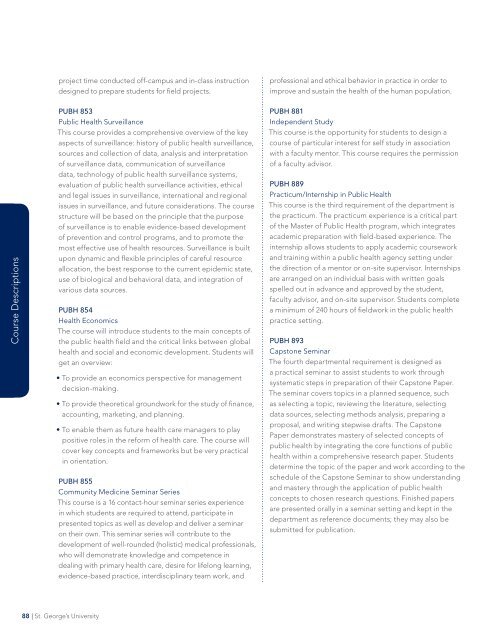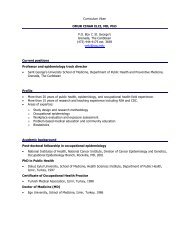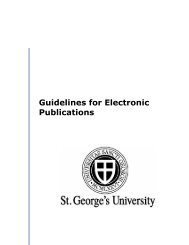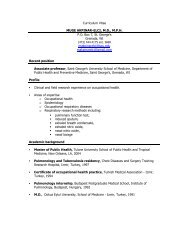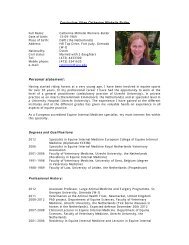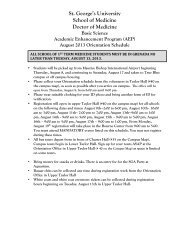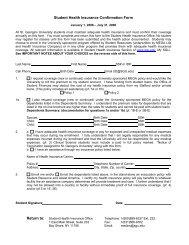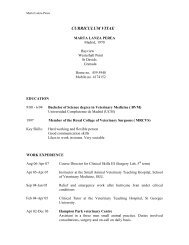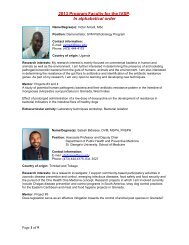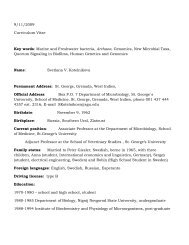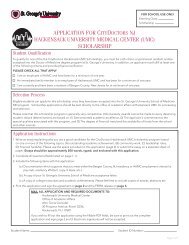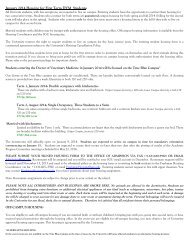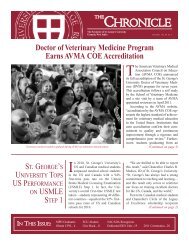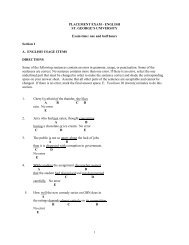SCHOOL OF 2012-2013 - St. George's University
SCHOOL OF 2012-2013 - St. George's University
SCHOOL OF 2012-2013 - St. George's University
Create successful ePaper yourself
Turn your PDF publications into a flip-book with our unique Google optimized e-Paper software.
School of Medicine<br />
Course Descriptions<br />
project time conducted off-campus and in-class instruction<br />
designed to prepare students for field projects.<br />
PUBH 853<br />
Public Health Surveillance<br />
This course provides a comprehensive overview of the key<br />
aspects of surveillance: history of public health surveillance,<br />
sources and collection of data, analysis and interpretation<br />
of surveillance data, communication of surveillance<br />
data, technology of public health surveillance systems,<br />
evaluation of public health surveillance activities, ethical<br />
and legal issues in surveillance, international and regional<br />
issues in surveillance, and future considerations. The course<br />
structure will be based on the principle that the purpose<br />
of surveillance is to enable evidence-based development<br />
of prevention and control programs, and to promote the<br />
most effective use of health resources. Surveillance is built<br />
upon dynamic and flexible principles of careful resource<br />
allocation, the best response to the current epidemic state,<br />
use of biological and behavioral data, and integration of<br />
various data sources.<br />
PUBH 854<br />
Health Economics<br />
The course will introduce students to the main concepts of<br />
the public health field and the critical links between global<br />
health and social and economic development. <strong>St</strong>udents will<br />
get an overview:<br />
• To provide an economics perspective for management<br />
decision-making.<br />
• To provide theoretical groundwork for the study of finance,<br />
accounting, marketing, and planning.<br />
• To enable them as future health care managers to play<br />
positive roles in the reform of health care. The course will<br />
cover key concepts and frameworks but be very practical<br />
in orientation.<br />
PUBH 855<br />
Community Medicine Seminar Series<br />
This course is a 16 contact-hour seminar series experience<br />
in which students are required to attend, participate in<br />
presented topics as well as develop and deliver a seminar<br />
on their own. This seminar series will contribute to the<br />
development of well-rounded (holistic) medical professionals,<br />
who will demonstrate knowledge and competence in<br />
dealing with primary health care, desire for lifelong learning,<br />
evidence-based practice, interdisciplinary team work, and<br />
professional and ethical behavior in practice in order to<br />
improve and sustain the health of the human population.<br />
PUBH 881<br />
Independent <strong>St</strong>udy<br />
This course is the opportunity for students to design a<br />
course of particular interest for self study in association<br />
with a faculty mentor. This course requires the permission<br />
of a faculty advisor.<br />
PUBH 889<br />
Practicum/Internship in Public Health<br />
This course is the third requirement of the department is<br />
the practicum. The practicum experience is a critical part<br />
of the Master of Public Health program, which integrates<br />
academic preparation with field-based experience. The<br />
internship allows students to apply academic coursework<br />
and training within a public health agency setting under<br />
the direction of a mentor or on-site supervisor. Internships<br />
are arranged on an individual basis with written goals<br />
spelled out in advance and approved by the student,<br />
faculty advisor, and on-site supervisor. <strong>St</strong>udents complete<br />
a minimum of 240 hours of fieldwork in the public health<br />
practice setting.<br />
PUBH 893<br />
Capstone Seminar<br />
The fourth departmental requirement is designed as<br />
a practical seminar to assist students to work through<br />
systematic steps in preparation of their Capstone Paper.<br />
The seminar covers topics in a planned sequence, such<br />
as selecting a topic, reviewing the literature, selecting<br />
data sources, selecting methods analysis, preparing a<br />
proposal, and writing stepwise drafts. The Capstone<br />
Paper demonstrates mastery of selected concepts of<br />
public health by integrating the core functions of public<br />
health within a comprehensive research paper. <strong>St</strong>udents<br />
determine the topic of the paper and work according to the<br />
schedule of the Capstone Seminar to show understanding<br />
and mastery through the application of public health<br />
concepts to chosen research questions. Finished papers<br />
are presented orally in a seminar setting and kept in the<br />
department as reference documents; they may also be<br />
submitted for publication.<br />
88 | <strong>St</strong>. George’s <strong>University</strong>


